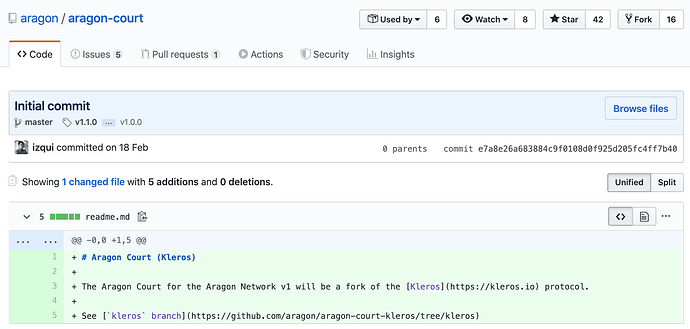Kleros protocol
It is the Aragon who inspired me - see the screenshot from the initial commit.
Kleros is not just a bunch of guys building software that runs on the Ethereum blockchain. Kleros is more, Kleros is the protocol.
What does the protocol consists of?
Blockchain does not know what is fair, just, legal, agreeable. Only humans (or sufficiently advanced AI) who can tell. But how to reflect data on the blockchain?
Kleros protocol in a nutshell:
- Staking token - rational financial incentives to keep the system honest.
- Individual cases - Shelling point
- Slashing inactive and dishonest jurors.
- The prohibitive cost of 51% attacks
If you can explain in a few sentences in plain English - it is simple enough.
Complexity is the opponent of simplicity and adoption. That is why the current version of the Kleros protocol is simple, the existing apps in production are simple.
Various improvement proposals to Kleros protocol
Based on my active participation in this crypto-economics experiment, I was able to observe some real-life situations.
 Winning side is automatically funded for appeals
Winning side is automatically funded for appeals
Look: Proposal: Kleros Cooperative Coommunity Fund (KCCF) DAO and funding the appeals
That conversation landed in the transparency report: Kleros Transparency Report
We studied how fee insurance should be structured to maximally encourage the participation of economically self-interested third party insurers. These ideas are important in maximizing the defense against bank attacks and ensuring that there is an environment where actors with modest resources that are parties to disputes are not at too great a disadvantage relative to actors with greater resources.
 Explicitly limit to 5-6-7 appeal rounds
Explicitly limit to 5-6-7 appeal rounds
We have jurorsForCourtJump and cost of the appeal in general court=MAX_INT. If you are clever enough and know how to read the code, it means that after a few rounds, the number of juror doubles and cases lands in general court and all the jurors participate, but the cost is MAX_INT so it’s effectively game over.
 Require 2/3 majority
Require 2/3 majority
Also in that thread: Discussion: limiting the max number of appeals to avoid bleed 🩸 war of attrition
Check the Mysterium token - http://kleroscan.com/dispute/135 - 7 yes, 6 no - such controversial cases should have more scrutiny, more jurors… In the current version of the protocol - no clear enough incentives to fund the losing side. Keen to discuss and experiment the 2/3 threshold and legitimising “0” as unclear / undecided / cannot tell with full confidence.
 Legitimate “0” unsure, unclear, it depends, need more info, ambiguous
Legitimate “0” unsure, unclear, it depends, need more info, ambiguous
Currently we “0” catch-all and surely there is a difference between something totally illegal, such as arbitrating assassination market or I was away for Xmas and didn’t vote.
On the same note, legitimate “666” evil (number of the beast), unethical, harmful
 Harsher penalties for inactive jurors
Harsher penalties for inactive jurors
More incentives to remain active. Check this out, noone voted: Jurors refused to arbitrate - but is says "token rejected" · Issue #63 · kleros/tokens-on-trial · GitHub
Penalties to be proportional to the staked amount.
Giant whale losing 3000 PNK - not a big deal. Losing 5% (the floor at 3000) is much more painful.
 Allow withdrawing with mutual agreement
Allow withdrawing with mutual agreement
Kleros might not be the best way moving forward. A or B are neither OK, guys figured option C which is better.
 Allow giving up
Allow giving up
Someone may realize it’s game over and save some money.
“I lose, the evidence, the existing votes (and previous rounds) of the jurors are convincing me I’m losing, let’s save money on juror fees, simply give up.”
It can happen also during the vote? 7 jurors, 4 already voted “no”. You know you will lose, maybe you can give up and pay less in fees? (the 3 remaining ones will not get paid, assuming non-concealed votes)
 Weighted vote
Weighted vote
See dedicated blog post: Weighting votes "beyond reasonable doubt" - because sometimes a juror might be genuinely not sure... 🤷♀️
Data-based approach - more experiments
I wish Kleros 1000+ cases in the coming months - this is required to test some of these protocol improvements in real life.
I hope to meaningfully contribute to creating integrations - marking evidence as fake news, annotating web as fake news. See this tweet:
https://twitter.com/marsxrobertson/status/1211372518445072384
Kleros on layer 2 - fast enough, cheap enough - we can annotate the whole web. Realistically speaking, critical mass might be an issue, but I can see it coming - a self-fulfilling prophecy, people on the internet choosing a publisher because they use Kleros to verify fake news.
You can also read my observations about fake news: Extending "fake news" prevention mechanism + banning "fake news" (just like you ban chemical weapons, land mines and nukes)
(Shilling “The Great Hack” - https://www.youtube.com/watch?v=iX8GxLP1FHo - on Netflix - it is indeed hack of the epic proportions)
